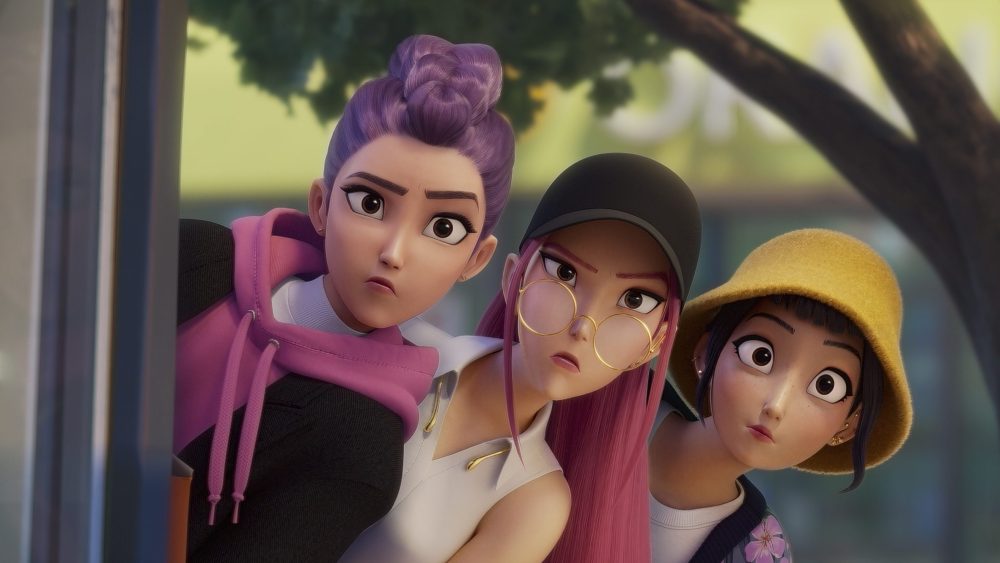Netflix’s “KPop Demon Hunters” has exploded into a global cultural phenomenon and shows no sign of slowing down.
To borrow from the title of the chart-topping song, the film is “Golden,’ and smashing records in its path. It’s the biggest movie ever to stream on Netflix. Four songs from the film’s soundtrack sit on Billboard’s top 10, and the film landed the top spot at the domestic box office – a first for the streamer.
The film follows Huntr/X, a KPop girl group whose members double as demon hunters. Arden Cho, May Hong and Ji-young Yoo provide the speaking voices for Rumi, Mira and Zoey, respectively. EJAE, Rei Ami and Audrey Nuna provide the respective singing voices.
Escaping the fictional bands Huntr/x and Saja Boys is nearly impossible. While EJAE, a K-pop singer, is used to hearing her voice on demo tracks, hearing the songs played everywhere is taking getting used to. “Hearing it at H Mart on the radio. It’s weird,” she says.
The film’s popularity “hasn’t fully set in” for Cho. At a recent screening, she had a waitlist for her young nieces and nephews. She understands its mass appeal regardless of age. Cho says, “It allows any human or person to feel like they can relate. It’s like they feel seen.”
Both sat down with Variety to discuss the film’s success, the importance of visibility and battling demons.
‘KPop Demon Hunters’ has become a phenomenon. What does it mean for you to be a part of it?
EJAE: We broke many records; I feel so proud. We wouldn’t have been able to do without the collective alchemy of the filmmakers and animators. Each person had such a valuable part in it.
ARDEN CHO: I hope it excites people in our business. Who would have thought that animation would be the thing to put us on the map? This is the first big movie that highlights Korean Americans, our culture, and it has made people so excited about Korea.
There are moments in the songs that transition from English to Korean, which all adds to the authenticity of telling this story. What was it like to have that creative liberty in the songwriting process?
EJAE: One of the biggest assets I brought to the movie, or when writing the songs, was being bilingual. It was important for our co-director, Maggie Kang, to have Korean in the lyrics, and I just love that it’s not just the verses; it was in the actual song too.
Also, it’s not just Korean girls singing the songs. It feels surreal, and that’s what I wish I had growing up. People didn’t know where Korea was. I grew up used to watching animation not set in Korea. When I went to the sing-along, I saw these little girls singing Korean, which warms my heart. It feels great to spread Korean culture all over the world. It wasn’t like randomly adding Korean words; it was important to me to make Korean work seamlessly into English. It was a great learning experience and a fun challenge to have, and a great way to express the song that both Koreans and Americans can relate to.
CHO: We’re so lucky to have Black Label (Blackpink’s producers) be a part of this journey and make these songs. It’s an amazing narrative and story, but it’s also these killer songs. They’re interwoven with one another. You can’t have the songs without the movie, and you can’t have the movie without the songs.
What is it that you love about Rumi?
EJAE: She’s incredibly hardworking and has that leadership. She puts her best foot forward, but she tries to hide her imperfections and flaws. That’s something I’ve always struggled with. I connected with her, wanting to feel loved in every way, not just for her perfect side. The scene that I love is when she says, “Why can’t you love all of me?” It’s something I wanted to say for so long. And then her perseverance, to know how to approach this demon and embrace it, was so beautiful because I feel like that’s how I was able to grow as a person; being able to not just deal with your demons, but actually cope and embrace your demons.
CHO: As Asian women in the business, we’re also hungry for that complex character. We all love her because she’s the lead. I hope that this sparks an interest in people, saying we want to hear more stories of different cultures. A lot of the struggles Rumi has with her identity and Celine (Yunjin Kim) are very Korean, in that faults and fears must be hidden. I love being an open book about the times that I’ve felt that I wanted to give up, because I hope that encourages someone to keep going. But in Asian culture, it’s about hiding or covering that, and only showing your best version. And I feel with this new generation of Korean Americans, we’re owning that and saying, “Let’s break that trauma.”
It’s very new for Korean culture to even talk about therapy. With this movie, we’re breaking generational trauma without telling people we are. In a very interesting way, the number of people who have found healing from some of those emotional scenes has been incredible. Something that might look so cute and fluffy on the outside, like “KPop Demon Hunters,” is actually so deep and meaningful and so incredibly powerful.
This interview has been edited and condensed.

